
Combretum, the bushwillows or combretums, make up the type genus of the family Combretaceae. The genus comprises about 272 species of trees and shrubs, most of which are native to tropical and southern Africa, about 5 to Madagascar, but there are others that are native to tropical Asia, New Guinea and the Bismarck Archipelago, Australia, and tropical America. Though somewhat reminiscent of willows (Salix) in their habitus, they are not particularly close relatives of these.

Ochna is a genus comprising 79 species of evergreen trees, shrubs and shrublets belonging to the flowering plant family Ochnaceae. These species are native to tropical woodlands of Africa, Madagascar, the Mascarenes and Asia. Species of this genus are usually called ochnas, bird's-eye bushes or Mickey-mouse plants, a name derived from the shape of the drupelet fruit. The name of this genus comes from the Greek word ὄχνη (ókhnē), used by Theocritus and meaning "wild pear", as the leaves are similar in appearance. Some species, including Ochna integerrima and O. serrulata, are cultivated as decorative plants.

Campylospermum is a genus of flowering plants in the family Ochnaceae. It includes 55 species native to tropical Africa, India, Indochina, Hainan, and western Malesia.

Faurea is a genus containing 16 species of flowering plants in the protea family which occur in the summer rainfall area of southern Africa, extending to tropical Africa and Madagascar. The name honours South African soldier and botanist William Caldwell Faure (1822-1844) who was killed on active service in India.
Memecylon dasyanthum is a species of plant in the family Melastomataceae. It is endemic to Cameroon. Its natural habitat is subtropical or tropical moist montane forests. It is threatened by habitat loss.

Thesium is a genus of flowering plants in the family Santalaceae. It is particularly well represented in South Africa.

Tetracera is a genus of flowering plants of the Dilleniaceae family native to the tropics. Several species are lianas.
The APG III system of flowering plant classification is the third version of a modern, mostly molecular-based, system of plant taxonomy being developed by the Angiosperm Phylogeny Group (APG). Published in 2009, it was superseded in 2016 by a further revision, the APG IV system.

Rhoicissus is an Afrotropical plant genus in the grape family Vitaceae and subfamily Vitoideae. There are between nine and twenty-two accepted species.
Baumia is a genus of flowering plants belonging to the family Orobanchaceae.

Chytranthus is a genus of flowering plants belonging to the family Sapindaceae. It includes 32 species of small trees and shrubs native to tropical Africa, ranging from Guinea eastwards to Kenya and Tanzania and south to Angola. Most species have a palm-like habit, with large pinnate leaves and unbranched trunks.
Deinbollia is a genus of flowering plants belonging to the family Sapindaceae.
Dicranolepis is a genus of flowering plants belonging to the family Thymelaeaceae.

Luxemburgia is a genus of flowering plants belonging to the family Ochnaceae.








